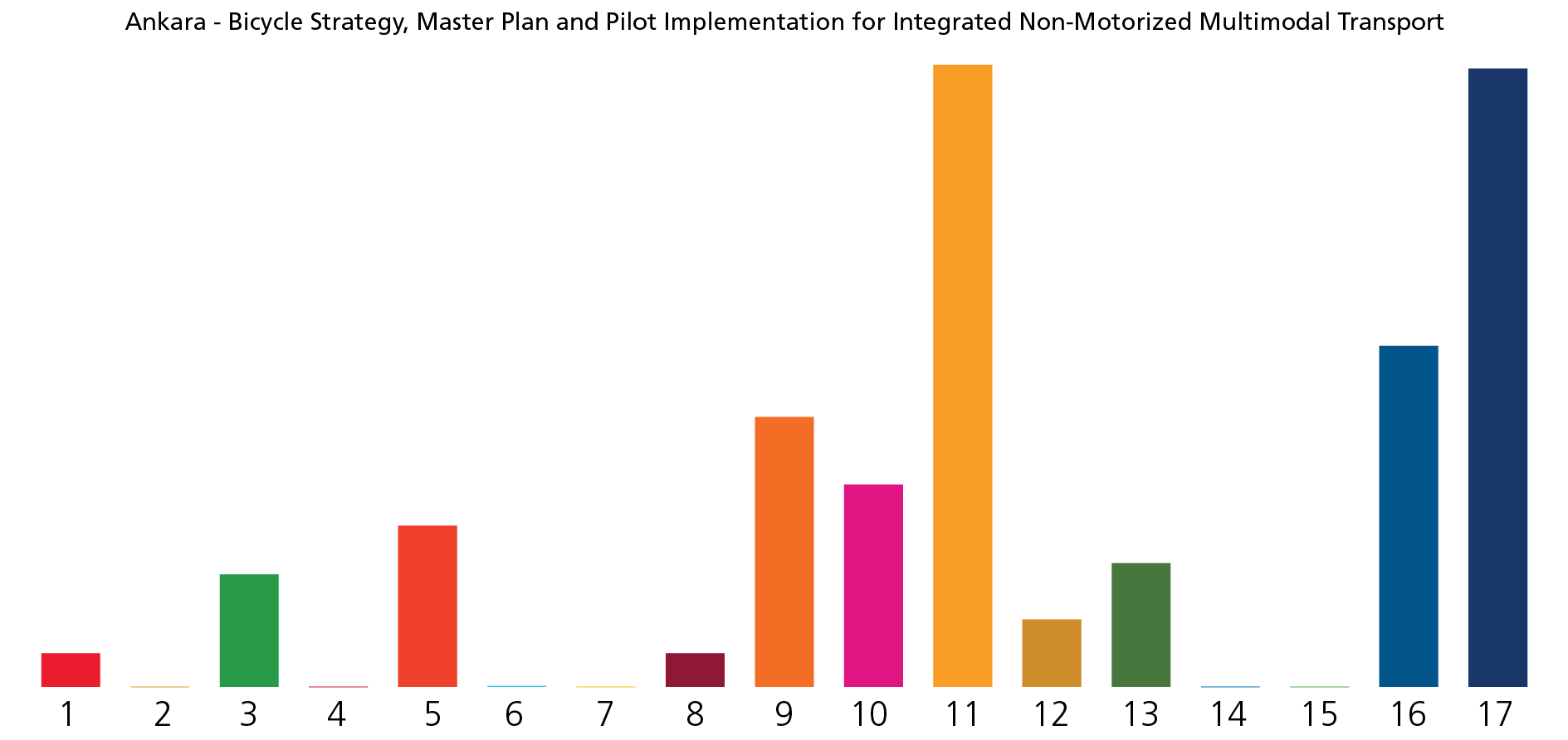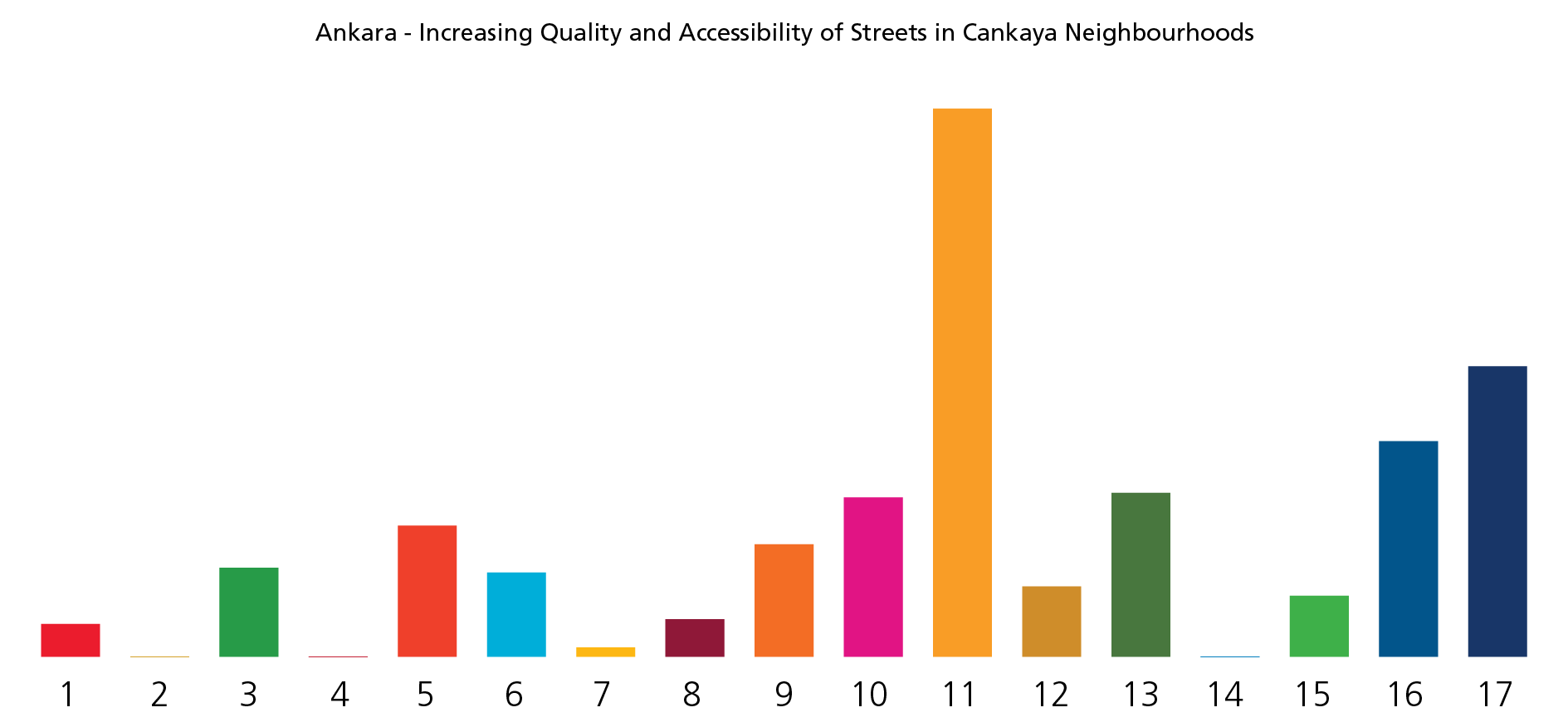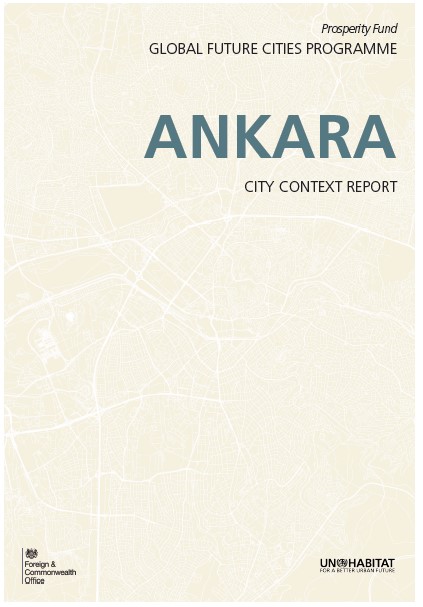Ankara is the capital of Turkey and is Turkey’s political and administrative core. With a current population of 5.4 million, the capital has experienced rapid growth during recent decades.
Despite many attempts of government and planners, Ankara’s urbanisation process has been characterized by sprawl and fragmentation . Although the road network and public transport system have developed significantly in the past three decades, the urban sprawl makes mobility a critical issue for the city’s functionality. During the past two decades of increased car utilisation, Ankara has faced challenges such as traffic congestion, increased travel times and traffic accidents. Despite the negative consequences of car dependence, investments in urban roads are increasing. Similar investment for improving public transport and Non- Motorized Transport systems (NMT) have lagged behind. The environment for pedestrians and cyclists across the city is poor at present, with a prioritisation of road traffic within streetscapes and thus poor road safety.
There are structural deficiencies at a human scale in the city’s built environment. One major issue is the highly neglected pedestrian circulation and the lack of social interaction in open public spaces. Narrow sidewalks, often occupied by cars in the residential neighbourhoods, leave little room for pedestrian circulation and nor do they allow the development of a socially active and inclusive street life. Public interaction in the city is confined to reserved areas such as semi-public parks or buildings. This includes community centres, shopping malls and cafes. As a result of the provision and quality of open public spaces, the air pollution and the adequate accessibility and connectivity in the city are challenges that Ankara needs to resolve.
In Ankara, the projects identified are focused on the preparation of a bicycle strategy and master plan for Ankara, and the development of urban designs, implementation plans and replicable methodologies for increasing quality and accessibility of streets in Çankaya neigbourhoods.
The Global Future Cities Programme aims to support the municipality in the preparation of a city-wide Bicycle Strategy and Master Plan, as well as assisting the pilot implementation development in a prioritized area of the city.
The recently prepared Transportation Master Plan for 2038, which is yet to be approved, proposes an extended network of bicycle roads; however, a Bicycle Transport Master Plan does not exist for Ankara. Additionally, as was demonstrated in the charrette that took place within the framework of the Programme, most stakeholders support the promotion of public transport systems, especially non-motorized mobility, as a main strategy for reducing traffic congestion in the central areas of Ankara.
The proposed intervention seeks to integrate a bicycle transportation system within the existing mobility network of Ankara. It will address systemic improvements between bicycle-pedestrian and bicycle-motor vehicle interaction, the feasibility of park and ride systems integration and the design of a bicycle road network. The pilot project will develop the first stage for implementing the Bicycle Master Plan in a specific area of the city. Furthermore, the overall strategy will include subsequent phases to extend the network from the pilot to a larger area and to city-wide in the mid and long term. Finally, communication campaigns and capacity building will be part of the intervention in order to ensure the sustainability and ownership of the final outcome by citizens and institutions
This tailormade sheet aims to demonstrate how the SDG Project Assessment Tool's General Framework has been tailored to the project in Ankara, Turkey. It highlights how the project includes the priorities within the Sustainable Development Goals, and the different principles that were selected for this project. As this sheet has been tailored to the project's scope and needs, the performance criteria has been selected in consultation with the partners of the Programme.

The Global Future Cities Programme aims to provide technical assistance and capacity building to the Çankaya District Municipality for improving the streets and the open public space of its neighbourhoods to favour a more liveable urban environment and to promote better quality of life.
The intervention targets neighbourhood scale actions and the incentive revolves around changing the streetscape, including cross-sections, towards better
open public spaces and urban quality. The development of living streets, designed primarily for the interests of pedestrians and cyclists, contributes to a more safe space, especially for children, elderly and women while, at the same time, reducing barriers for the disabled.
The approach to implement street redesign and upgrades, while increasing the proximity and accessibility of urban services and developing more accessible and safer open public spaces for pedestrians, has a high impact on the quality of life of residents. Furthermore, the streets are often catalysts for increasing urban economy and security and strengthening the sense of community identity and collective ownership.
The intervention will develop urban designs, implementation plans and replicable methodologies. Additionally, it will include neighbourhood design workshops, public information exchange tools and joint decision-making mechanisms at a local level. This localised planning approach can also use digital planning tools for better data utilisation and, potentially, be integrated into the nationwide Smart City Strategy currently being developed by the Ministry of Environment and Urbanization.
This tailormade sheet aims to demonstrate how the SDG Project Assessment Tool's General Framework has been tailored to the project in Ankara, Turkey. It highlights how the project includes the priorities within the Sustainable Development Goals, and the different principles that were selected for this project. As this sheet has been tailored to the project's scope and needs, the performance criteria has been selected in consultation with the partners of the Programme.

Ankara has experienced a rapid growth during the last decades. Population has increased from 2 million in 1970, to 5.4 in 2018
Car utilization has increased in the past two decades.
The environment for pedestrians and cyclists across the city is poor at present, with a prioritisation of road traffic within streetscapes and thus poor road safety
The pedestrian circularion is highly neglected such as narrow sidewalks often occupied by cars.
There is a lack of provision and quality of open public spaces.

The Ankara City Context Report is part of a series of reports provided for each city of the Global Future Cities Programme, serving as a tool to frame the proposed Programme interventions within the characteristics and conditions of each city. The City Context Report provides a general analysis of the spatial, financial, and legal conditions in the city, followed by potential impact of the interventions, and a set of evidence-based recommendations for successful implementation and maximised benefits. In Ankara, the projects identified are focused on the preparation of a bicycle strategy and master plan for Ankara, and the development of urban designs, implementation plans and replicable methodologies for increasing quality and accesibility of streets in Çankaya district.

